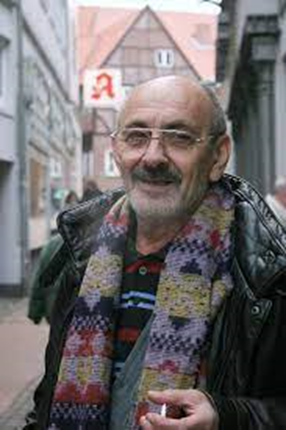HIRSH RELES (April 23, 1913-2004)
He was a prose author and poet, born in the town of Chashniki (Čašniki), Byelorussia. He moved to Vitebsk in 1930, graduated from the Jewish pedagogical technical school there, and continued his studies at the Minsk Pedagogical Institute, before becoming a teacher in a Jewish middle school in Slutsk and later Novogrudok. In the first days of the war, he was drafted into the Red Army and served in the northern Ural Mountains where they were digging new coal mines. Initially, he worked on the layout, and later as secretary of the army newspaper. After the war he returned to Minsk where he worked for a Byelorussian children’s magazine Zorka (Morning star) and a satirical journal Vozhyk (Hedgehog). He began publishing in 1931 with a poem in Yunger arbeter (Young worker). He contributed to: Yunger leninets (Young Leninist), Oktyabr (October), Minsk’s Shtern (Star), the almanac Mit festn trop (With a steadfast step), and frequently later in Sovetish heymland (Soviet homeland). He joined the writers’ association in 1934 and went on to publish his first poetry collection, entitled Onheyb (Beginning). His poetry also appeared in Horizontn (Horizons) (Moscow: Sovetski pisatel, 1965). In book form: Onheyb (Minsk: Byelorussian State Publishers, 1939), 56 pp. In 1948 he returned to pedagogical work, teaching literature and language in an evening school; after 1956 he began writing prose in Russian and published several books in Russian; two of his books appeared in Byelorussian translations. The appearance in print of Sovetish heymland proved a shot in the arm for Reles in the 1960s. He made an extensive trip through the towns of Byelorussia, and wrote up documentary stories, novellas, and essays which were included in his Untern fridlekhn himl, rayse-bilder, noveln, dertseylungen (Under peaceful skies, travel impressions, novellas, stories) (Moscow: Sovetski pisatel, 1983), 302 pp., and Iber vaysrusishe shtetlekh (Through Byelorussian towns) (Moscow: Sovetski pisatel, 1985), 61 pp. These issues continued to bother him in subsequent years as well. In the 1990s and early 2000s, he prepared a volume of memoirs for publication which dealt with Yiddish writers from Byelorussia, and he actively contributed to the work of the Minsk Jewish Cultural Association, led a circle of people studying the Yiddish language, and gave lectures before an assortment of seminars and symposia devoted to Yiddish culture. His last work was a memoir: Di yidish-sovetishe shrayber fun vaysrusland, memuarn (Soviet Yiddish writers in Byelorussia, memoirs) (Minsk: Logvinaŭ, 2004), 271 pp.
Sources: Chone Shmeruk, comp., Pirsumim yehudiim babrit-hamoatsot,
1917-1961 (Jewish publications in the Soviet Union, 1917-1961) (Jerusalem,
1962), see index; Folks-shtime
(Warsaw) (April 27, 1963).
Khayim Maltinski
[Additional information from: Berl Kagan, comp., Leksikon fun yidish-shraybers (Biographical dictionary of Yiddish writers) (New York, 1986), cols. 553-54; and Chaim Beider, Leksikon fun yidishe shrayber in ratn-farband (Biographical dictionary of Yiddish writers in the Soviet Union), ed. Boris Sandler and Gennady Estraikh (New York: Congress for Jewish Culture, Inc., 2011), pp. 369-70.]
